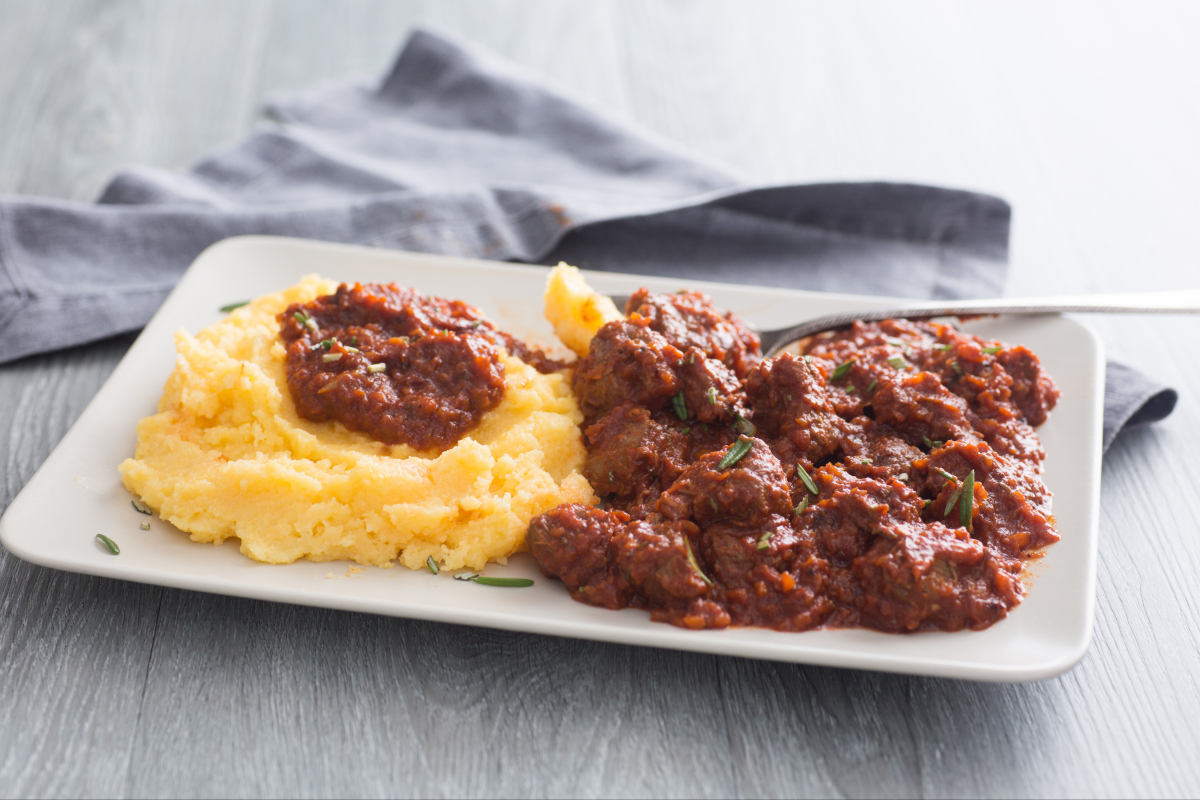Polenta
- Average
- 1 h 20 min

Braised pork cheeks are, honestly, the kind of thing you find on winter tables across Central Italy. Seriously good stuff. They bring this comforting touch to any meal. The magic of braised pork cheeks? It's all about how they become so tender from slow cooking, absorbing all those rich flavors from the sauce. And look, while guanciale is usually the star in dishes like Amatriciana, here it takes center stage in a completely different way. Really really packed with flavor. It turns moist when cooked low and slow. And paired with creamy polenta? You get that classic mix loved in Northern and Central Italy—something that really warms you up when it’s chilly outside. Add a nice red wine, and you’ve got a meal that feels just right for winter.
The polenta balances everything, soaking up the juices from the pork and giving you a creamy, smooth bite with every forkful. Families across Central Italy often put their own spin on a pork cheeks recipe, sometimes adding borettane onions for a sweet note or swapping in beef cheeks with artichokes for a fresh twist. And the slow-cooked pork is where the magic happens. For sure. Letting the meat take its time until it’s fall-apart tender—that’s the kind of comfort food people crave on cold nights.
Here's the thing, the flavors in this savory pork dish are bold, but the polenta keeps everything grounded and filling. It is the kind of hearty meal perfect for sharing. No question. There’s something about that combo of rich meat and soft polenta that feels right at a big family table. With tender pork cheeks and a polenta side dish, you end up with a plate that tastes like it came straight from an Italian kitchen—crafted for those long, relaxed meals that stretch into the evening. It's not fancy, just really tasty food that hits the spot when you need something cozy and filling. This dish is all about enjoying simple, authentic flavors that make you feel like you’re dining in the heart of Italy.
You might also like:

To make the cheeks with polenta, first clean and finely chop the vegetables (carrot, onion, and celery) and the garlic for the sauté 1. Also, chop the rosemary 2 and cut the pork cheeks into bite-sized pieces 3.

Take a cast iron pan and pour in a drizzle of oil 4. Add the chopped vegetables and garlic 5 and rosemary, and let them sauté over moderate heat until they are wilted. This will take about 5 minutes. At this point, add the cheeks 6.

Increase the heat and brown them on all sides 7. Deglaze with the red wine and let the wine evaporate, keeping the heat high 8. Also, pour in the tomato puree 9.

Salt 10, pepper, cover with a lid 11, and lower the heat to a minimum. Cook for 100 minutes, stirring occasionally. Meanwhile, prepare the polenta: place a thick-bottomed stainless steel pot with water on the stove, and when the water is about to boil, add the salt 12.

Pour the cornmeal in a steady stream while stirring with a wooden spoon 13, maintain cooking at high temperature while stirring quickly. Also, add the oil 14 and continue stirring until it resumes boiling, then lower the heat to a minimum and continue cooking for 50 minutes over low heat, stirring continuously 15.

After 50 minutes, the polenta is ready; increase the heat so it detaches well from the pot 16. Meanwhile, the cheeks will also be cooked 17; serve them hot together with the polenta 18.